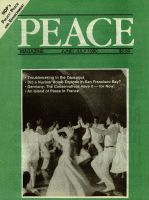
Peace Magazine Jun-Jul 1990, page 19. Some rights reserved.
Search for other articles by Subir Guin here
PALAU-For 20 years the people of the tiny island of Palau have resisted U.S. pressure for unrestricted access to its land and waters, in return for economic subsidies under a so-called "Compact of Free Association."
Mter Palau became a U.N. Trust territory under U.S. jurisdiction in 1947, the people framed a constitution which requires 75% voter approval for matters of major significance, which shows the high value they place on consensus. In 1979, 92% of the people supported a nuclear-free clause, which put them on a collision course with Washington.
THE PENTAGON'S determination to obtain free access to Palau for the next 50 years-and specifically, the freedom to bring nuclear, chemical or biological weapons into that country-hasn't changed, despite reduced Easti West tensions. This may be due to the uncertain future of two major U.S. bases, Clark and Subic Bay, in the Philippines.
As Cold War tensions are gradually disappearing in Europe and Warsaw pact forces are being dismantled, the United States, which has so often accused the Soviets of global expansionism, is herself determined to remain entrenched in the Pacific. JoAnn Wypijewski of The Nation, describes Washington's policy of "strategic denial" against a nonexistent, though still convenient foe. She calls this a means of protecting free transit for the U.S. Navy, establishing a host of radar tracking stations and test sites, and securing their freedom to exploit theregion's resources.
In the seventh vote in seven years, only 60.4% of voters who cast their ballots supported the Compact, despite an allocation of U.S. $100,000 to get citizens to the polls. In the last referendum 74% voted yes. An exit poll suggests the most common reason for a "no" vote is the anti-nuclear sentiments shared by Palauans. But they have paid a high price for their resistance to the U.S. Government corruption, drug trafficking, political assassinations (which have never been properly investigated), a decaying infrastructure, and a $40 million debt for an electrical generating system nobody wanted, are the legacy of 40 years of American Trusteeship.
THROUGH EIGHT referenda, they have endured economic and physical threats, intimidation and violence, legal chicanery and false promises. Attempts to amend the constitution and approve the compact led Palau's courageous women elders to take the matter to court. They even travelled to Washington a few years ago to plead their case before Congress and the American public, but got scant media coverage and consequently little support for their cause.
M OST PALAUANS clearly remain committed to maintaining a nuclear-free environment. The U.S. persists in asserting its political and economic self-interest in this tiny nation, with total disregard for the wishes of its people, and the democratic vote which has been reaffirmed each year since 1983.
The U.S. continues to tinker with the terms of compensation and lean on corruptible Palauan leaders, whose salaries are subsidized by allocations from Washington.The women elders still defend the integrity of their land, their culture, and their independence through informing their fellow citizens of the consequences of caving in to foreign interference.
But American foreign policy has enlarged on the Monroe Doctrine. Now any corner of the globe, not just the Western Hemisphere, can become strategically vital to their interests, and woe to any nation who opts to keep out of Americas' lethal embrace.
Source: "Palau Vote: Compact Not Adopted," PACIFIC NEWS BULLETIN (FebruaryI990). Adapted by Subir Guin, an Associate Editor of PEACE.

Peace Magazine Jun-Jul 1990, page 19. Some rights reserved.
Search for other articles by Subir Guin here